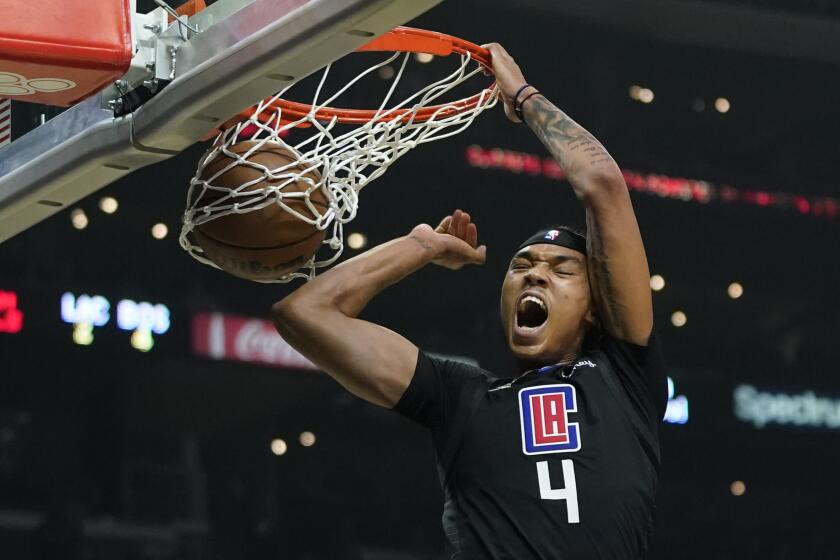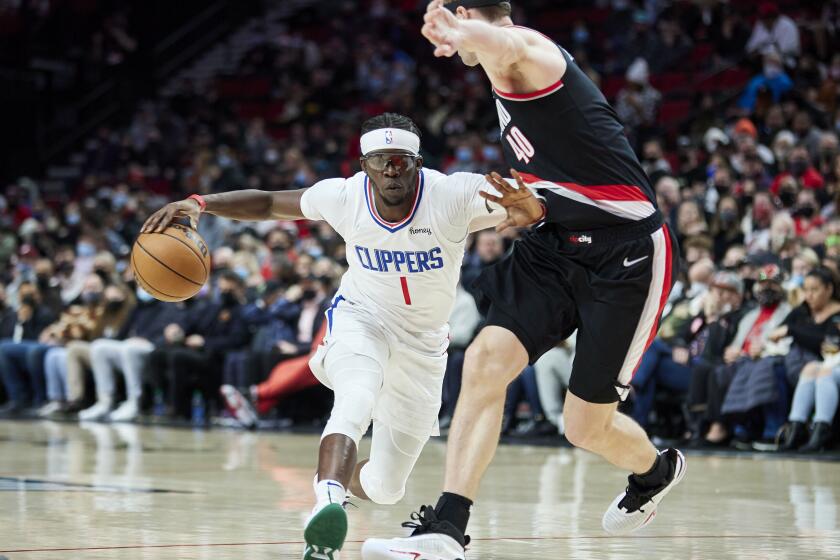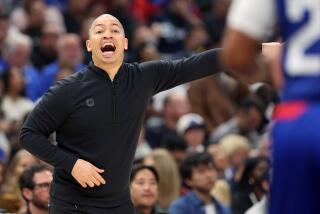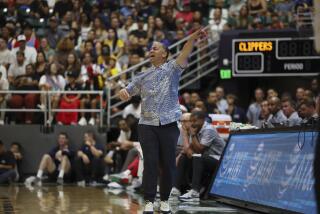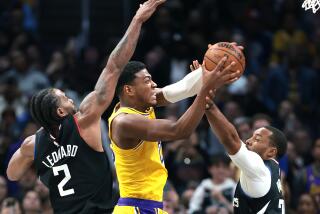Reggie Jackson isn’t the only Clipper having some struggles, but his are most visible
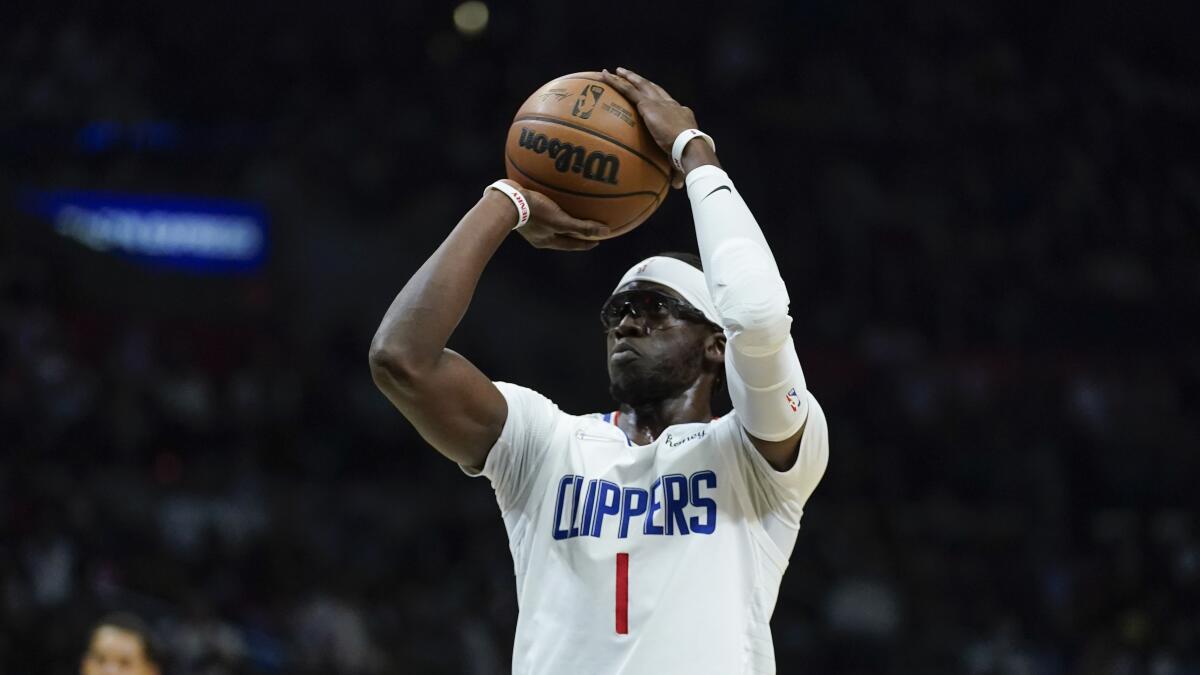
- Share via
A shooting spell of the kind Reggie Jackson is in would have sent the Clippers point guard straight to the practice facility for more work earlier in his career.
“Going back and repping it too many times, maybe 100, and just burning myself out,” Jackson said Friday.
Now 31 and in his 11th season, Jackson knows he can’t fix a stretch like his last seven games, in which he has made 34% of his shots and 26% of his three-pointers, the same way, not after injuries derailed his late 20s. A career 34% three-point shooter who has shot nearly 39% from deep since joining the Clippers last year, Jackson has come to believe in the law of averages and feels less flustered when the results do not immediately appear. Maturation has taught him that working on his shot is as much about mental study as physical reps.
“When I’m in shooting spells now is to go back and watch the film, try to watch where I’m getting my shots at, making sure I’m taking good ones, try not to force ones, see how the floor balances and things of those nature,” he said. “When I do that, I think I’m just realistic with myself. How makeable of a shot is it?
“I trust more so in my preparation rather than my younger years.”
With Paul George injured, Clippers rookie Brandon Boston Jr. shows why the team considers him such a big part of their future in win over Celtics.
Amid Kawhi Leonard’s rehabilitation from knee surgery, the Clippers’ playoff hopes have hinged on finding consistent offense from every player in their rotation, not just their stars. One quarter of the way through the schedule, it has been a study in inconsistency.
Clippers coaches make a point of highlighting the team’s passing numbers, from total passes to potential assists, guard Luke Kennard said, and while they’re attempting only about three fewer passes per game than last year, according to the NBA’s tracking data, they have produced the sixth-fewest potential assists and rank around the middle in assist-to-pass percentage.
Coach Tyronn Lue’s ideal offense is a drive-and-kick scheme that turns drives into the paint into open three-pointers. But often it has grown stagnant, marked by overdribbling. Jackson’s struggles at times to correct such issues aren’t unique to him. But his role as the primary ballhandler makes any dry spells particularly visible.
Last season, 16% of his three-pointers were unassisted — a product of the Clippers’ ball movement and his ability to play more off of the ball given Leonard and Paul George’s roles as offensive focal points. This season, nearly a third of those three-pointers are unassisted. Shots taken within three feet of the rim also make up a career-low share of his shot diet, and his points scored in the paint make up the smallest share of his scoring in five years.
Slightly more of Jackson’s shots have come against tighter defense than last season, but his shooting numbers aren’t only the story of defenses focusing more on Jackson with Leonard out. His share of attempts deemed wide open also has risen too. And when the shots have not fallen, he has turned to his experience and patience for guidance, relying on what he calls his “daily vitamins” — preparation that is as much mental as physical.
“I gotta take care of my mind and make sure I’m good,” Jackson said. “…For me it’s seeing plays, seeing what the other team is doing, and at this stage, it is more mental for me than physical. [I’ve] put in a lot of time so it’s more mentally seeing how people are scheming against us, how they’re probably gonna come out and attack us, both sides of the ball, and trusting that I did all my work.”
The Clippers pulled away late to beat the Trail Blazers 102-90 on Monday in Portland to improve to 13-12 on the season.
He also has implicit trust in Lue. Last week Lue earned praise for his late-game play calls that turned blitzing and ball-screen hedging strategies used by the Lakers and Portland Trail Blazers against them for baskets.
“You can watch it on film after the games or whatever, but just to see something in a second or two while everything is going on, it’s definitely something special,” Kennard said.
Both Kennard and Jackson said that while Lue values analytics that prize three-pointers and layups, he does not constrain his players from shooting where they feel comfortable, even if that is the typically lesser-efficient midrange.
“They understand we have to take some of them to continue to allow the offense to be open,” Jackson said. “So I’m always appreciative at this juncture coming from what I’ve played in previous times where it’s just analytically driven, and it feels like there’s no feel to the game. I’m much more appreciative that we use the numbers and we use our eye tests hand in hand. So there I don’t know too many shots T. Lue discourages other than terrible, contested shots.”
And if he takes such a contested shot, Jackson will see it the next day, on video.
UP NEXT
VS. ORLANDO
When: 12:30 p.m., Saturday
On the air: TV: Bally Sports SoCal; Radio: 570, 1330
Update: Paul George (elbow strain) has been ruled out while Nicolas Batum (ankle sprain) is doubtful. The Magic (5-21) have lost 10 of their last 11 games, but 6-foot-10 rookie Franz Wagner has been a bright spot, making 37% of his three-pointers while averaging 13.8 points. Orlando and the Clippers (14-12) rank among the NBA’s bottom five in transition scoring. The Magic’s pick-and-roll ball handlers and roll men each rank second worst in scoring efficiency.
More to Read
Get our high school sports newsletter
Prep Rally is devoted to the SoCal high school sports experience, bringing you scores, stories and a behind-the-scenes look at what makes prep sports so popular.
You may occasionally receive promotional content from the Los Angeles Times.

